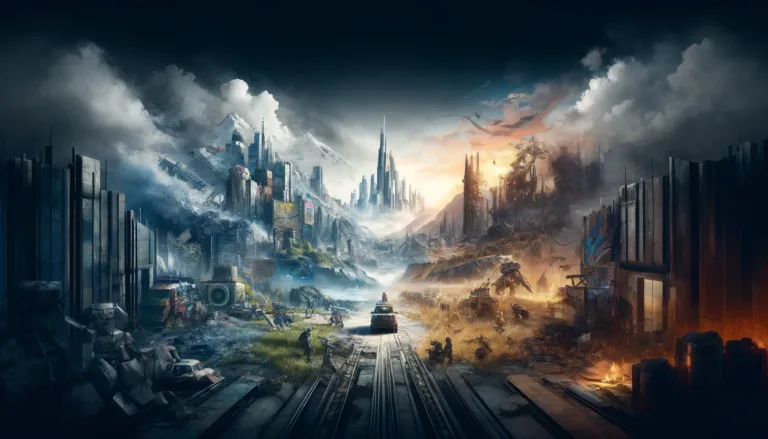Introduction
Every year, countless video games fade into obscurity – not because they’re forgotten, but because they’re forcibly removed from our reach. The culprit? The rise of digital decay through the shutdown of dedicated game servers. As a passionate gamer and developer, I’ve taken a stand against this practice, rallying behind a growing petition with over 950 signatures. This movement isn’t just about nostalgia; it’s about our right to access the games we’ve purchased, the communities we’ve built, and the history we’ve participated in. Let’s explore why this issue matters and what can be done to keep our digital playgrounds alive.
The Current State of Game Servers
In the gaming world, dedicated servers have become a double-edged sword. Titles like the latest Call of Duty and Battlefield rely on these servers to deliver seamless multiplayer experiences. However, when newer versions are released, older game servers are often shut down, leaving players with unplayable titles despite their initial investment.
This practice reached a new low with Ubisoft’s handling of The Crew. Not only did they shut down servers, but they also removed the game entirely from players’ libraries, citing that what was bought was merely a “timed license,” a term that redefines ownership in ways that only benefit the corporate bottom line. This aggressive push towards newer titles under the guise of licensing issues reveals a disturbing trend towards eroding consumer rights in digital media.
Balancing Game Development Realities
As a game developer myself, I understand the intricacies and challenges of keeping game servers operational long after a title’s prime. Maintaining these servers involves not just ongoing costs for hardware and electricity but also for the staff required to manage and troubleshoot these systems. For smaller studios or games with dwindling player bases, these costs can quickly become prohibitive, making server shutdowns a tough but necessary decision.
However, this doesn’t mean that the community’s needs should be ignored. While the financial burden of old servers is real, the industry needs to find a balance that respects the investments players have made. This could mean innovative solutions to reduce costs or alternative ways to keep games alive without full developer support.
A Call for Community-Driven Solutions
Recognizing the economic constraints that often lead to server shutdowns, there is a promising alternative that can satisfy both developers and the gaming community: enabling players to host their own servers. By allowing the community to take the reins in the final days of a game’s official support, developers can reduce their operational costs while preserving the game’s accessibility and legacy.
For instance, classics like Call of Duty 4, Call of Duty 5, and Battlefield 2, 3, and 4 thrived on a model where players could host their own servers, fostering a vibrant community that could self-sustain. Implementing a server browser or a list, and releasing the necessary server files to the public, could empower gamers to keep their favorite worlds alive indefinitely.
This approach not only extends the life of games but also reinforces the bond between developers and their audience, demonstrating a commitment to the players’ long-term enjoyment over short-term financial gains.
Preserving Our Digital Legacy
The importance of video game preservation extends beyond merely keeping old games playable; it’s about safeguarding our cultural heritage and ensuring future generations can experience and learn from past gaming innovations. Unfortunately, this noble goal is often undermined by DRM (Digital Rights Management) and stringent anti-cheat systems, which can render games completely unplayable once support ceases.
For example, older games that employed systems like SecuROM or Denuvo are notorious for causing issues long after their release. When servers that validate these DRM protections go offline, legally purchased games become inaccessible, punishing legitimate owners instead of deterring pirates. This highlights a critical flaw in how games are protected and managed, suggesting a need for DRM policies that consider long-term accessibility.
Moreover, as the industry evolves, there’s a growing recognition of the need to balance effective anti-cheat measures with the longevity of the gaming experience. Developers must design these systems with an eye toward the future, ensuring they don’t inadvertently prevent games from being played down the line.
Rediscovering Classics: Learnings from Half-Life and Bioshock
In our journey through gaming history, revisiting classics like Half-Life and the Bioshock series underscores the importance of preserving these digital treasures. In my article, “Rediscovering the Magic of Half-Life: A Timeless Gaming Experience“, I explored how Half-Life’s innovative design continues to influence modern gaming. Similarly, “Diving into Rapture: My Unforgettable Bioshock 1 & 2 Journey” delves into the artistic and narrative depth of the Bioshock series, which remains poignant years after its release.
These articles not only celebrate the games themselves but also highlight why such experiences must not be lost to time. By enabling older games to remain playable, we ensure that future gamers can appreciate why these titles are revered, providing context and continuity in the ever-evolving tapestry of the gaming industry.
Conclusion
The issue of game server shutdowns and restrictive DRM policies is more than a mere inconvenience—it’s a challenge to the rights and experiences of gamers worldwide. As we’ve discussed, solutions exist that can protect our digital legacies while respecting both the economic realities of game development and the rights of consumers. By supporting initiatives like the “Stop Killing Games” petition, we advocate for practices that ensure games remain accessible and playable for years to come.
Games like Half-Life and Bioshock remind us of the power and potential of video games as cultural artifacts. Let’s not allow these masterpieces—or any games—to disappear into the void of inaccessibility. Join the movement, sign the petition, and help us preserve the rich history of gaming for future generations to explore and enjoy.

